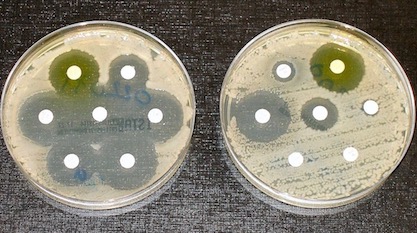 Evolution
Evolution
 Medicine
Medicine
No, Despite Often-Heard Claims, Antibiotic Resistance in Bacteria Is Not Evolution


Editor’s note: As biologist Jonathan Wells observes, “[T]he measures being taken against the SARS-CoV-2 pandemic owe nothing to evolutionary theory.” Yet a persistent claim from evolutionists is that medical research would be crippled without a Darwinian framework. Evolution News presents a series of our previously published work addressing the myth of “Darwinian medicine.”
Darwinian biologist and blogger P.Z. Myers wrote a post in which he lamented the fact that medical researchers rarely invoke evolution in their published research, whereas evolutionary biologists routinely invoke evolution. This is of course true.
I pointed out that this is because evolutionary inferences are of no significant help to medical research. Inference to evolution is a narrative gloss on the real science in medicine. It is a point that I, along with others, have been making for years. Myers unintentionally provides striking confirmation that doctors and medical researchers don’t refer to evolution because it’s irrelevant to their science.
A Common Claim
Now Myers writes a follow-up post in which he insists that evolution is relevant to medicine, despite the virtual absence of evolutionary reasoning expressed in the medical literature. Specifically, he insists that bacterial resistance to antibiotics is an example of evolution — a common claim — and he scolds doctors and medical scientists for not explicitly saying so in their research.
You hear this all the time in the media. Writing in The New Yorker last week, for example, Adam Gopnik scolded evolution doubters:
Evolutionary science is not abstract — evaluating reports of a “superbug” in Los Angeles, wrought immune by natural selection to antibiotics, means applying Darwinian principles as they go about their often scary work.
This notion, however, is mistaken. Bacterial resistance to antibiotics has nothing to do with evolution. Evolution, in the Darwinian sense of undirected (unintelligent) process of random heritable variation and natural selection, is the process by which populations of living things change over time without intelligent agency causing or guiding the process. When the process of change in populations is guided by intelligence, it is called artificial selection — breeding.
Darwin’s Contribution?
Of course I’m not the first to point this out. Charles Darwin, in the Origin of Species, made exactly the same argument. In his first chapter, he discussed artificial selection — animal husbandry and breeding of plants. In subsequent chapters he developed an argument that in nature, changes in population are accomplished by natural selection, without intelligent agency. Darwin distinguished artificial selection from natural selection — he distinguished breeding from evolution, and of course his theory of evolution is a theory of natural selection, not a theory of animal husbandry or plant breeding, which had been practiced for thousands of years and to which Darwin contributed nothing.
Bacterial resistance to antibiotics is artificial selection. Antibiotics are intelligently designed by medical researchers, deliberately administered to patients by doctors, who understand that there are some bacteria that are not sensitive to the antibiotic and that have the potential to proliferate. Actually, the administration of antibiotics that kill some but not all of the bacteria in the patient is quite deliberate, because there are huge populations of beneficial bacteria (e.g., in the gut) that should not be killed since they are necessary for health.
Antibiotic research and treatment is a carefully planned intelligently designed process of breeding the human microbiome (the aggregate of bacteria that live in a human being). The purpose of breeding the microbiome is to eliminate the bacteria causing the disease but to preserve the beneficial bacteria (and to preserve the patient). Of necessity some of the bacteria must survive the treatment — the trick is to kill the pathological bacteria and leave only the beneficial bacteria alive. This cannot always be accomplished, and when it is not accomplished — that is, when some of the bacteria left alive are pathological and not beneficial — this is the development of antibiotic resistance. Antibiotic resistance in pathological bacteria is the undesirable consequence of the treatment of bacterial infections. It is not natural selection.
There are many strategies in place to minimize bacterial resistance to antibiotics, all of which are breeding the human microbiome — the process of treating a patient who has a bacterial infection. Antibiotic treatment of infections — both the desirable and undesirable consequences of the planned therapy — is the application of intelligent design principles to medical research and treatment.
Antibiotic treatment and the development of antibiotic resistance are artificial selection. Antibiotic treatment is not evolution, which is the consequence of unintelligent undirected unplanned natural selection. Evolution, understood in the Darwinian sense that Myers and other Darwinists intend, is precisely what antibiotic treatment is not.
An Obvious Example of ID
What’s remarkable here is that Myers and others like him don’t even understand what evolution is. They deny that intelligent design is evolution, yet they cite an obvious example of intelligent design (antibiotic treatment) as an example of evolution par excellence.
The treatment of infectious diseases with antibiotics is a superb example of intelligent design principles applied to medical research and human biology. Darwinian principles of evolution are not invoked by medical researchers because Darwinian principles contribute nothing to medical research, and medical researchers are relatively insulated from the career-threatening ideological pressure that permeates evolutionary biology.
Medical researchers are free to just do the science. The magnificent advances in medical care in modern times attest to the success of the application of design principles, not Darwinian fairy tales, to medical science.
Image: “Antibiotic resistance tests,” by Dr Graham Beards (Own work) [CC BY-SA 3.0], via Wikimedia Commons.
This post was originally published on February 26, 2015.
